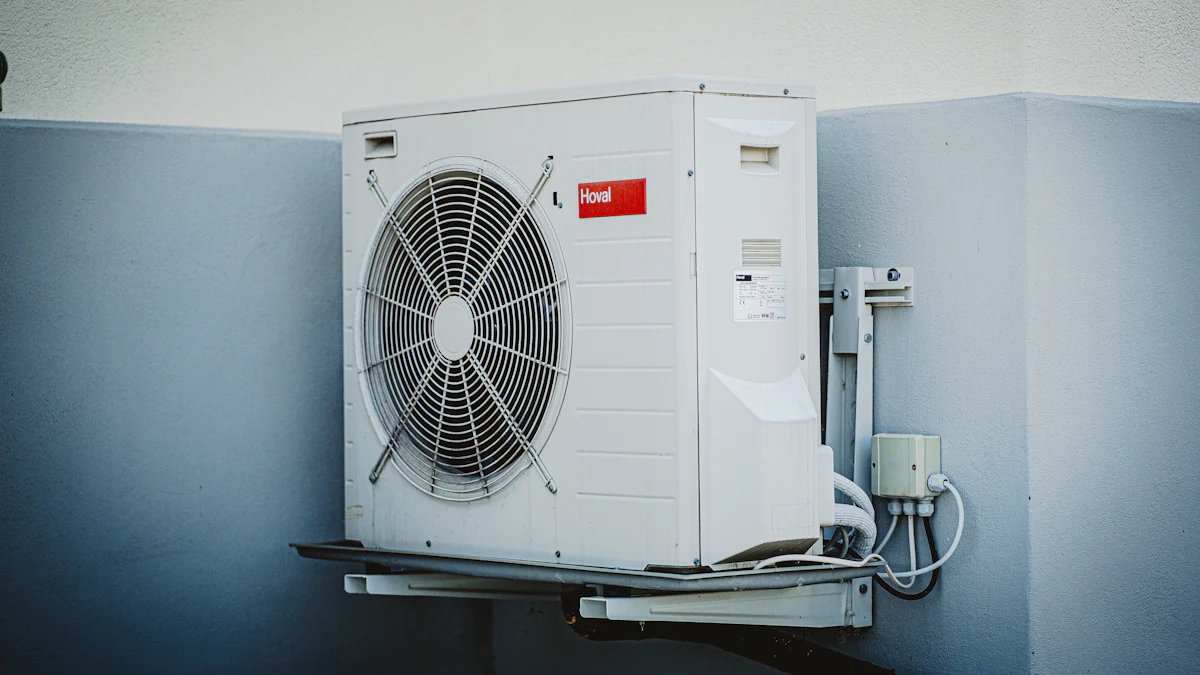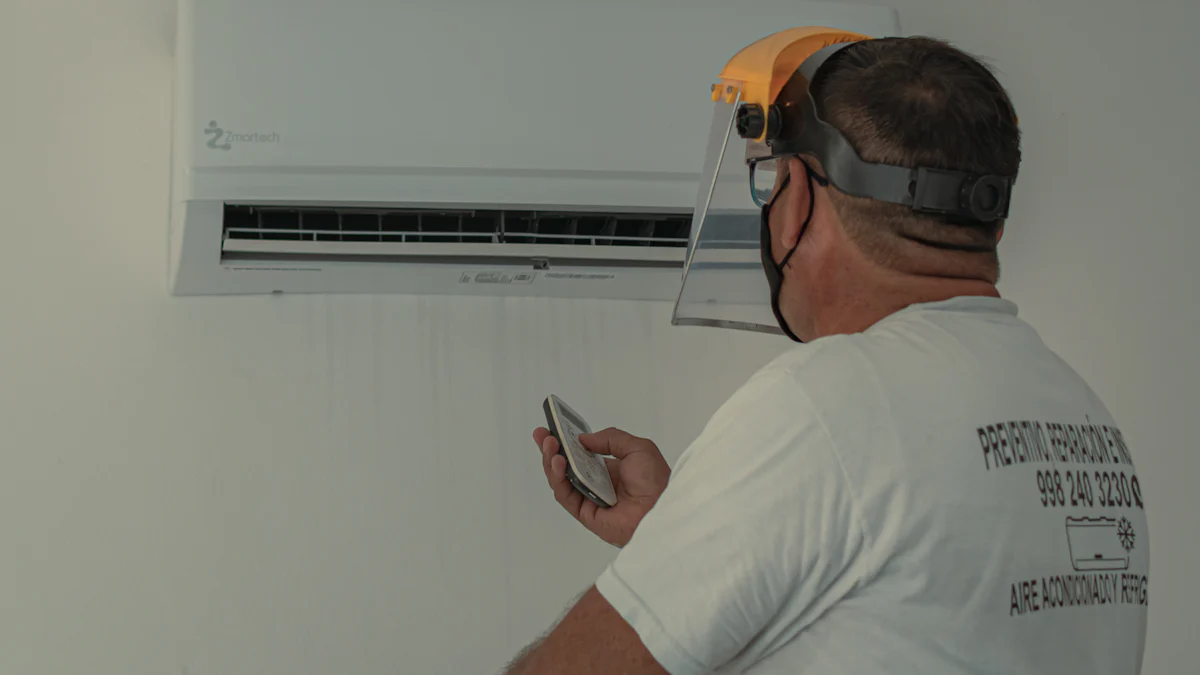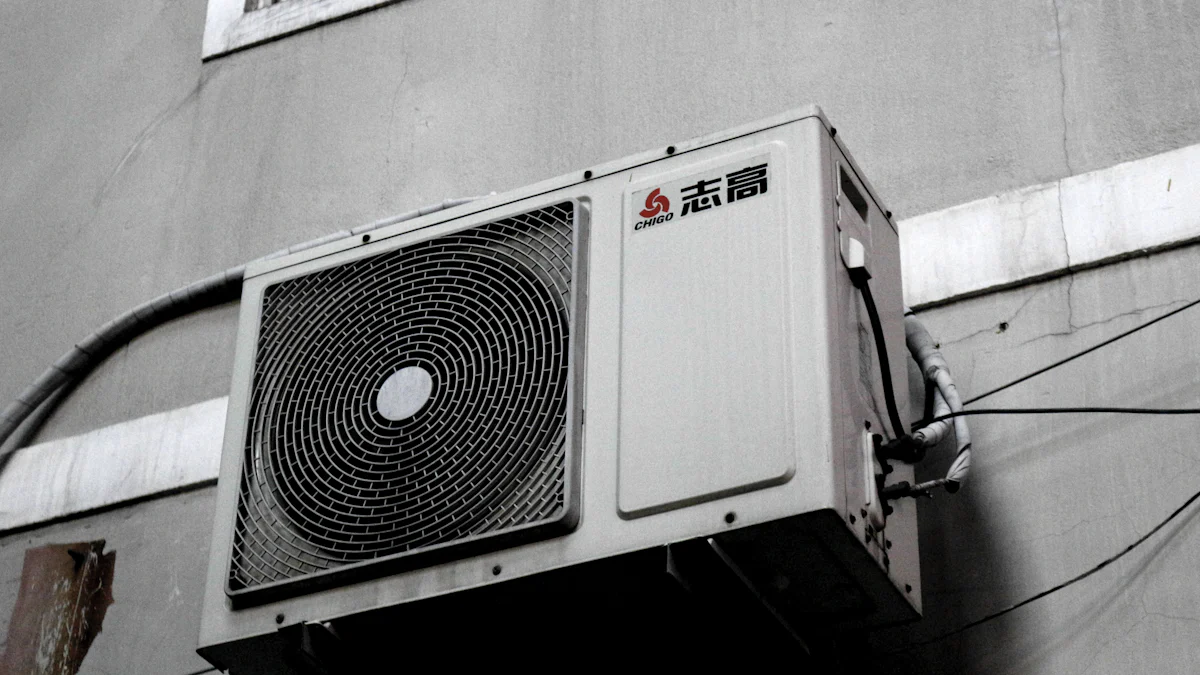How to Diagnose Hot Copper Pipes in Your Air Conditioner

Have you ever noticed your air conditioner copper pipe hot to the touch? This issue can signal a problem that needs your attention. Copper pipes are crucial for moving refrigerant through your HVAC system, ensuring it cools effectively. Diagnosing why these pipes overheat is essential to maintaining your air conditioner's efficiency and preventing further issues like an air conditioner copper pipe leak or air conditioner copper pipe corrosion. Don't worry, though! You can follow our step-by-step guide to tackle this problem head-on and keep your home comfortable.
Understanding the Basics of Your Air Conditioner
To tackle the issue of your air conditioner copper pipe hot to the touch, you first need to understand the basics of your air conditioning system. This knowledge will empower you to identify potential problems and take appropriate action.
Components of an Air Conditioning System
Your air conditioner consists of several key components that work together to cool your home. Let's break them down:
The Role of Copper Pipes
Copper pipes play a crucial role in your HVAC system. They transport refrigerant, which absorbs and releases heat, allowing your air conditioner to cool your space effectively. Copper pipes play a crucial role. Copper tubes are favored for their durability, excellent thermal conductivity, and energy efficiency. They resist corrosion, thanks to a protective oxide layer, making them a reliable choice for refrigeration circuits. If you notice an air conditioner copper pipe leak or corrosion, it could disrupt this essential process.
How the Cooling Process Works
The cooling process involves the refrigerant cycling through the system. It absorbs heat from your indoor air and releases it outside. The refrigerant travels through the copper pipes, changing from a liquid to a gas and back again. This cycle keeps your home cool and comfortable. If the copper pipes become hot, it may indicate a disruption in this cycle.
Common Causes of Hot Copper Pipes
Understanding why your air conditioner copper pipe hot can help you address the issue promptly. Here are some common causes:
Refrigerant Issues
Low refrigerant levels can lead to inefficient cooling and overheating of the pipes. You might notice your air conditioner struggling to maintain the desired temperature. This problem often requires professional attention to check and refill the refrigerant.
Blocked Airflow
Blocked airflow can cause your air conditioner to work harder, leading to hot copper pipes. Dirty filters or obstructions in the vents can restrict airflow. Regularly inspecting and cleaning these components can prevent this issue.
Electrical Problems
Electrical issues, such as faulty wiring or malfunctioning components, can also cause the copper pipes to overheat. These problems might require a professional to inspect and repair the electrical system to ensure safe and efficient operation.
By understanding these basics, you can better diagnose and address issues with your air conditioner. Keep an eye out for signs of an air conditioner copper pipe leak or corrosion, as these can indicate underlying problems that need attention.
Initial Checks and Simple Solutions

When you notice your air conditioner's copper pipes are hot, start with some basic checks. These initial steps can often resolve the issue without needing professional help.
Checking the Thermostat Settings
Your thermostat plays a crucial role in regulating your air conditioner's performance. Here's how to ensure it's set correctly:
Ensuring Correct Temperature Settings
First, make sure your thermostat is set to "cool." The temperature should be lower than the current room temperature. This simple check can sometimes solve the problem if the settings were accidentally changed. If the thermostat screen is blank, the batteries might be dead. Replace them to restore functionality.
HVAC.com advises: "Start by ensuring your thermostat is set to 'cool' and that the temperature is set lower than the current room temperature."
Verifying Thermostat Functionality
After confirming the settings, check if the thermostat is functioning properly. Listen for a click when you adjust the temperature. This sound indicates that the thermostat is sending signals to the air conditioner. If you don't hear it, the thermostat might be faulty. Consider replacing it if necessary.
Inspecting Air Filters
Air filters are vital for maintaining airflow and preventing your system from overheating. Here's what to look for:
Identifying Dirty or Clogged Filters
Dirty or clogged filters can restrict airflow, causing your air conditioner to work harder and heat up the copper pipes. Remove the filters and hold them up to the light. If you can't see through them, they're likely clogged with dust and debris.
Replacing or Cleaning Filters
If the filters are dirty, clean or replace them. Most filters are reusable and can be washed with water. Let them dry completely before reinserting them. For disposable filters, replace them with new ones. Regularly checking and maintaining your filters can prevent future issues and keep your air conditioner running efficiently.
By following these simple steps, you can often resolve the issue of hot copper pipes in your air conditioner. These checks are easy to perform and can save you time and money by avoiding unnecessary repairs.
Intermediate Diagnostic Steps
When your air conditioner copper pipe feels hot, you might need to dig a little deeper. These intermediate steps can help you identify more complex issues that could be causing the problem.
Examining the Refrigerant Levels
Refrigerant is crucial for your air conditioner's cooling process. If the levels are off, it can lead to inefficiencies and overheating.
Signs of Low Refrigerant
Low refrigerant levels can cause several noticeable symptoms. You might hear hissing noises from the unit, see ice forming on the refrigerant line, or notice that the air conditioner isn't cooling as effectively as it should. These signs often point to a refrigerant leak, which requires professional attention. According to HVAC.com, low refrigerant levels can prevent your AC from cooling effectively, and it's essential to address this issue promptly.
How to Check Refrigerant Levels
Checking refrigerant levels isn't a DIY task. It requires specialized tools and expertise. If you suspect a problem, it's best to call a professional HVAC technician. They can safely measure the refrigerant levels and recharge the system if necessary. As noted by Trane.com, consulting a professional is recommended for refrigerant issues to ensure proper handling and environmental safety.
Assessing Airflow and Ventilation
Proper airflow and ventilation are vital for your air conditioner's performance. Blockages or poor ventilation can lead to overheating.
Checking for Obstructions
Start by inspecting the area around your air conditioner. Look for any objects or debris blocking the vents or the outdoor unit. Clear away leaves, dirt, or any other obstructions that might impede airflow. This simple step can significantly improve your system's efficiency and prevent the copper pipes from getting too hot.
Ensuring Proper Ventilation
Ensure that your air conditioning system has adequate ventilation. Check that all vents inside your home are open and unobstructed. Closed or blocked vents can restrict airflow, causing the system to work harder and potentially leading to overheating. Regularly maintaining clear and open vents helps keep your air conditioner running smoothly.
By following these intermediate diagnostic steps, you can address more complex issues that might be causing your air conditioner copper pipe to become hot. Remember, some tasks, like checking refrigerant levels, are best left to professionals to ensure safety and effectiveness.
Advanced Troubleshooting Techniques
When basic checks don't solve the problem, it's time to dive into advanced troubleshooting. These techniques will help you pinpoint more elusive issues with your air conditioner.
Inspecting Electrical Components
Electrical components play a crucial role in your air conditioner's operation. Faulty wiring or malfunctioning parts can lead to hot copper pipes.
Checking for Faulty Wiring
Start by examining the wiring connections in your air conditioner. Look for any signs of wear, such as frayed wires or loose connections. These issues can cause electrical resistance, leading to overheating. If you spot any damaged wires, it's best to call a professional electrician. They can safely repair or replace the faulty wiring.
Testing Capacitors and Relays
Capacitors and relays are essential for starting and running your air conditioner's compressor and fan motors. A malfunctioning capacitor or relay can cause the system to overheat. Use a multimeter to test these components. If you find a capacitor that doesn't hold a charge or a relay that doesn't switch properly, consider replacing them. This task might require professional assistance if you're not comfortable working with electrical components.
Evaluating the Compressor
The compressor is the heart of your air conditioning system. It compresses the refrigerant and circulates it through the system. A faulty compressor can lead to hot copper pipes.
Signs of Compressor Issues
Listen for unusual noises coming from the compressor, such as rattling or humming. These sounds can indicate mechanical problems. Also, check for oil leaks around the compressor, which might suggest internal damage. If your air conditioner struggles to cool your home, the compressor could be failing.
When to Call a Professional
Compressor issues often require professional intervention. If you suspect a problem, contact a certified HVAC technician. They have the tools and expertise to diagnose and repair compressor issues safely. Attempting to fix the compressor yourself can lead to further damage or void your warranty.
By following these advanced troubleshooting techniques, you can address more complex issues with your air conditioner. Remember, safety comes first. Don't hesitate to seek professional help when dealing with electrical components or the compressor.
Preventive Measures and Maintenance Tips

Keeping your air conditioner in top shape requires regular attention and care. By following some preventive measures, you can ensure your system runs efficiently and lasts longer. Let's dive into some essential maintenance tips.
Regular Maintenance Practices
Regular maintenance is the backbone of a well-functioning air conditioning system. It helps prevent issues like an air conditioner copper pipe hot to the touch or even an air conditioner copper pipe leak.
Scheduling Routine Inspections
Routine inspections are vital for catching potential problems early. Schedule a professional HVAC technician to inspect your system at least once a year. They can identify issues like air conditioner copper pipe corrosion before they become major headaches. Regular check-ups keep your system running smoothly and efficiently.
Air Specialties emphasizes: "Regular maintenance is crucial for keeping your heating and air conditioning systems running like a dream."
Keeping the System Clean
A clean system is an efficient system. Dust and debris can clog filters and block airflow, leading to overheating. Make it a habit to clean or replace your air filters every few months. This simple step can prevent your air conditioner from working harder than it needs to.
Air Specialties advises: "To maintain a healthy and efficient HVAC system, it’s important to check and replace your filters on a consistent basis."
Tips for Prolonging Air Conditioner Life
Extending the life of your air conditioner not only saves money but also ensures a comfortable home environment. Here are some tips to help you achieve that.
Energy Efficiency Practices
Energy efficiency is key to prolonging your air conditioner's life. Set your thermostat to a moderate temperature and use ceiling fans to circulate air. This reduces the strain on your system and helps prevent issues like an air conditioner copper pipe hot.
Seasonal Maintenance Tips
Each season brings different challenges for your air conditioner. In summer, ensure your outdoor unit is free from debris and has adequate ventilation. In winter, cover the unit to protect it from harsh weather. These seasonal tips help maintain your system's efficiency and prevent problems like air conditioner copper pipe corrosion.
By following these preventive measures and maintenance tips, you can keep your air conditioner running efficiently and extend its lifespan. Regular care and attention go a long way in preventing issues and ensuring a comfortable home environment.
You've now got a solid grasp on diagnosing hot copper pipes in your air conditioner. By following the steps outlined, you can tackle this issue head-on. Don't hesitate to roll up your sleeves and give these checks a try. You'll feel empowered knowing when to fix things yourself or call in the pros. Remember, every small step you take helps keep your home cool and comfortable. Celebrate your newfound skills and enjoy the peace of mind that comes with a well-maintained air conditioner.
See Also
Revealing the Enchantment: Copper Tubing for Air Conditioning
Benefits of Selecting Copper Tubing for Air Conditioning
The Transformation of Air Conditioning with Copper Tubing
The Essential Role of Copper Tubing in Effective Air Conditioning
Discovering the Sorcery: Copper Tubing Enhances Air Conditioning


